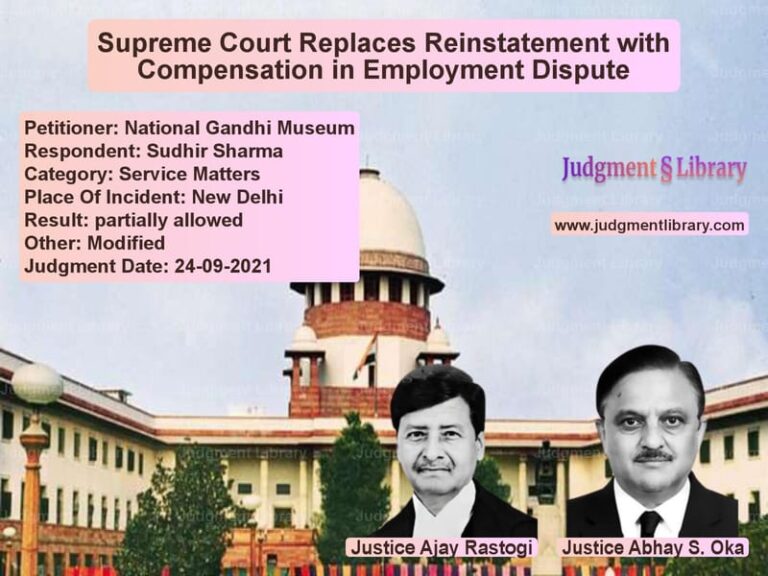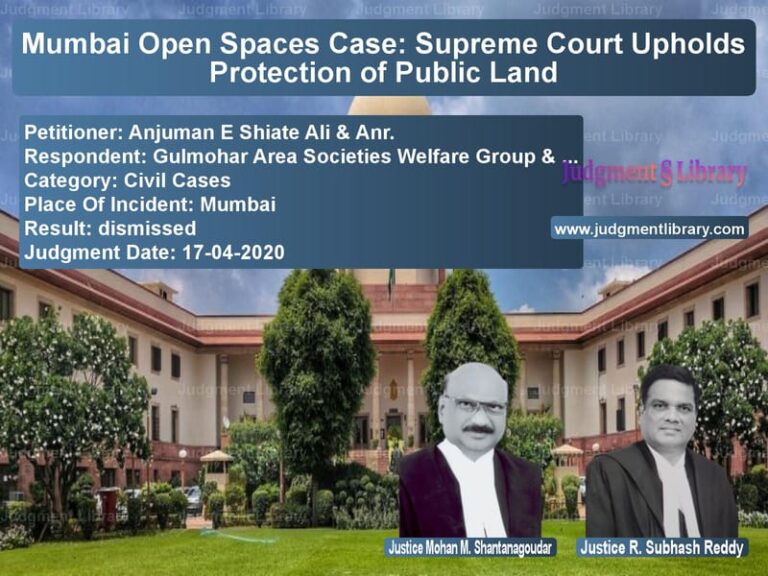Supreme Court Commutes Life Sentence to 9 Years in Murder Case Citing Sudden Provocation
The case of Premchand vs. The State of Maharashtra revolves around the conviction of the appellant for murder under Section 302 of the Indian Penal Code (IPC). The Supreme Court, upon re-examining the evidence, ruled that the appellant acted in a sudden fight without premeditation. The Court set aside the murder conviction and instead convicted him under Section 304, Part II, IPC, sentencing him to the period already served—nine years of imprisonment.
Background of the Case
The case pertains to the stabbing of Nandkishor Korde on September 26, 2013, at around 5:00 PM in Katol, Maharashtra. The prosecution alleged that the appellant, Premchand, fatally stabbed the victim and injured three others—Namdeo Korde, Vilas Charde, and Kunal Babhulkar.
Key events leading to the dispute:
- September 26, 2013: The incident took place in Katol, Maharashtra.
- September 27, 2013: The post-mortem report identified a stab wound on the victim’s neck as the cause of death.
- March 31, 2016: The appellant submitted a written statement claiming self-defense.
- August 6, 2019: The Bombay High Court upheld the conviction under Section 302 IPC and dismissed the appeal.
- March 3, 2023: The Supreme Court commuted the sentence from murder to culpable homicide not amounting to murder (Section 304, Part II IPC).
Arguments by the Appellant (Premchand)
The appellant’s counsel raised multiple arguments, including:
- The appellant was provoked when the victim spat on him and verbally abused him.
- There was a sudden quarrel, and the appellant was attacked first.
- Independent witnesses were not examined, which could have provided clarity.
- The knife was not recovered from the appellant.
- The appellant was a 58-year-old man at the time, making it improbable that he could overpower four individuals without provocation.
Arguments by the Respondent (State of Maharashtra)
The prosecution countered the appeal, arguing:
- The appellant attacked the victim with a knife and inflicted fatal injuries.
- Three other individuals were also stabbed.
- The case was clearly one of murder, and there was no justification for reducing the sentence.
Supreme Court’s Judgment
The Supreme Court ruled in favor of the appellant, commuting the murder conviction to culpable homicide not amounting to murder.
1. The Incident Was a Result of a Sudden Quarrel
The Court found that there was no premeditation in the attack.
“The offensive act committed by the appellant has to be appreciated in the surrounding circumstances… There was a missing link in the prosecution case as to the motive of the appellant.”
2. Appellant’s Written Statement Indicated a Lack of Premeditation
The Court took note of the appellant’s statement, which suggested that he was provoked.
“It is probable that there could have been provocation at the instance of the victim, who allegedly indulged in spitting on the appellant coupled with verbal abuse.”
3. Exception 4 to Section 300 IPC Applied
The Court held that the case fell under Exception 4 to Section 300 IPC:
“Culpable homicide is not murder if it is committed without premeditation in a sudden fight in the heat of passion upon a sudden quarrel.”
4. Appellant’s Age and Circumstances Considered
The Court took note of the fact that the appellant had already served nine years in jail and was in his late sixties.
“Since the appellant has suffered imprisonment for more than nine years and he is presently in his late sixties, we consider incarceration for such period as adequate punishment.”
Final Ruling
The Supreme Court:
- Set aside the conviction under Section 302 IPC.
- Convicted the appellant under Section 304, Part II IPC.
- Held that the sentence already served (nine years) was sufficient.
- Ordered the appellant’s immediate release, unless required in another case.
Implications of the Judgment
This ruling has significant implications for criminal jurisprudence:
1. Recognizing Sudden Provocation in Homicide Cases
- The judgment clarifies that not all killings amount to murder.
- Courts must assess whether provocation led to an unintentional killing.
2. Ensuring a Fair Trial
- The Court emphasized the importance of considering the accused’s statement.
- Failure to consider written statements can lead to wrongful convictions.
3. Setting a Precedent for Commuting Sentences
- The ruling provides guidance on when a murder conviction can be reduced to culpable homicide.
- It highlights the importance of analyzing surrounding circumstances in criminal cases.
Conclusion
The Supreme Court’s ruling in Premchand vs. The State of Maharashtra highlights the importance of assessing provocation and sudden fights in homicide cases. By commuting the life sentence to nine years, the Court ensured that justice was balanced between punishment and fairness.
Petitioner Name: Premchand.Respondent Name: The State of Maharashtra.Judgment By: Justice S. Ravindra Bhat, Justice Dipankar Datta.Place Of Incident: Katol, Maharashtra.Judgment Date: 03-03-2023.
Don’t miss out on the full details! Download the complete judgment in PDF format below and gain valuable insights instantly!
Download Judgment: premchand-vs-the-state-of-maharas-supreme-court-of-india-judgment-dated-03-03-2023.pdf
Directly Download Judgment: Directly download this Judgment
See all petitions in Murder Cases
See all petitions in Attempt to Murder Cases
See all petitions in Bail and Anticipatory Bail
See all petitions in Custodial Deaths and Police Misconduct
See all petitions in SC/ST Act Case
See all petitions in Judgment by S Ravindra Bhat
See all petitions in Judgment by Dipankar Datta
See all petitions in partially allowed
See all petitions in Modified
See all petitions in supreme court of India judgments March 2023
See all petitions in 2023 judgments
See all posts in Criminal Cases Category
See all allowed petitions in Criminal Cases Category
See all Dismissed petitions in Criminal Cases Category
See all partially allowed petitions in Criminal Cases Category







